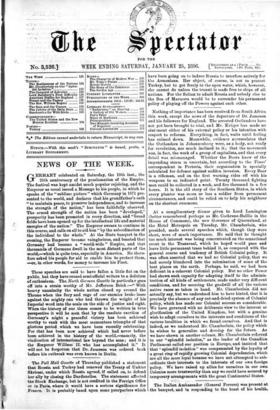At a complimentary dinner given to Lord Lamington (better remembered
perhaps as Mr. Cochrane-Baillie in the House of Commons), the new Governor of Queensland, at the Hotel Metropole on Tuesday, Mr. Chamberlain, who presided, made several speeches which, though they were short, were of much importance. He said that he thought too much interest was being concentrated on the sensational event in the Tranavaal, which he hoped would pass and leave little permanent trace behind it, as compared with the general course and tendency of British Colonial policy. It was often asserted that we bad no Colonial policy, that we had merely blundered into the colonisation of some of the best places on the earth. Perhaps, he said, we had been deficient in a coherent Colonial policy. But no other Power had shown such capacity for adapting itself to the adminis- tration of all kinds of settlements, made under very different conditions, and for securing the goodwill of all the various native races so taken in hand. Mr. Chamberlain did not actually say, but we understood him to have hinted, that it is precisely the absence of any cut-and-dried system of Colonial policy, which has made our Colonial success so considerable. We have governed with no deliberate view to the interest or glorification of the United Kingdom, but with a genuine wish to adapt ourselves to the interests and conditions of the various localities in which we found ourselves. And that is indeed, as we understood Mr. Chamberlain, the policy which he wishes to generalise and develop for the future. As we have shown in another column, Mr. Chamberlain referred to our "splendid isolation," as the leader of the Canadian Parliament called our position in Earope, and insisted that that "splendid isolation" was compensated by the loyalty of a great ring of rapidly growing Colonial dependencies, which are all the more loyal because we have not attempted to sub- ordinate their interests to the interests of our own foreign policy. We have raised up allies for ourselves in our own Colonies more trustworthy than any we could have secured by temporary arrangements with the great Continental States.


















































 Previous page
Previous page